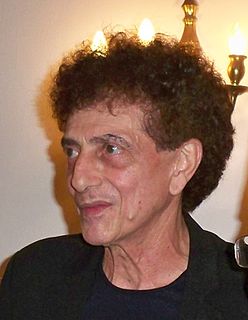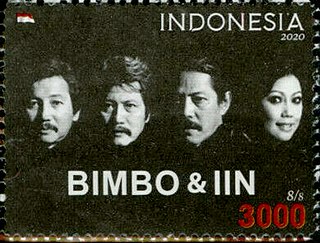Related Research Articles

Haji Abid Ghoffar bin Aboe Dja’far or better known as Ebiet G. Ade is an Indonesian singer-songwriter and guitarist of Javanese descent.

Hajji Chrismansyah Rahadi, born Christian Rahadi, better known by his stage name Chrisye, was an Indonesian progressive pop singer and songwriter. In 2011 Rolling Stone Indonesia declared him the third-greatest Indonesian musician of all time.

Ismail Marzuki was an Indonesian composer, songwriter and musician who wrote around 202 to 240 songs between 1931 and 1958, including numerous popular patriotic songs. Among his best-known works are "Halo, Halo Bandung", "Gugur Bunga", and "Rayuan Pulau Kelapa". In 1968, he was honoured with the creation of the well-known Taman Ismail Marzuki which is a cultural centre in Menteng in central Jakarta. In 2004 he was declared one of the National Heroes of Indonesia.

Badai Pasti Berlalu is the 1977 soundtrack to the Indonesian film of the same name. Rolling Stone Indonesia listed it as the best Indonesian album of all time. Three of its songs, Badai Pasti Berlalu, Merpati Putih, and Merepih Alam, were listed by Rolling Stone as among the best Indonesian songs ever released.

Guruh Gipsy is a 1976 Indonesian studio album released by Guruh Sukarnoputra in collaboration with the band Gipsy, consisting of Keenan Nasution, Chrisye, Roni Harahap, and Oding Nasution. Mixing modern instruments with traditional Javanese and Balinese music styles, it is now considered a landmark album. In 2007, Rolling Stone Indonesia voted it the second best Indonesian album of all time.
"Indonesia Maharddhika" is a song by Indonesian progressive rock band Gipsy, consisting of Chrisye, Keenan Nasution, Oding Nasution, Roni Harahap, and Abadi Soesman, together with Guruh Sukarnoputra. It was released in 1976 on the album Guruh Gipsy with the names of its contributors hidden in the bilingual lyrics. In 2009, Rolling Stone Indonesia selected it as the 59th best Indonesian song of all time.
"Gugur Bunga di Taman Bakti", better known as "Gugur Bunga", is an Indonesian patriotic song written by Ismail Marzuki in 1945. Written to honor the Indonesian soldiers killed during the Indonesian National Revolution, it tells of the death of a soldier, and the singer's feelings. It has since become a common song for protests and funerals. The song's line gugur satu, tumbuh seribu has entered common Indonesian vernacular.
Berlian Hutauruk is an Indonesian soprano of Batak descent. Beginning her career singing religious music in church, Hutauruk later sang for movie soundtracks and released a solo album. She is best known for singing "Badai Pasti Berlalu", which Rolling Stone Indonesia selected as the third-best Indonesian song of all time in 2009.

Fariz Rustam Munaf or better known as Fariz RM is an Indonesian singer-songwriter and multi-instrumentalist of mixed ethnic Betawi, Dutch and Minangkabau descent. He is the uncle of Indonesian singer-songwriter, Sherina Munaf.

Sudarwati, better known by her stage name Titiek Puspa, is an Indonesian singer and songwriter. Rolling Stone Indonesia has selected two of her songs as some of the best Indonesian songs of all time.

Soedjarwoto Soemarsono, better known by his stage name Gombloh, was an Indonesian singer and songwriter. He received the Nugraha Bhakti Musik Indonesia award from the Association of Singer Artists, Songwriters and Recording Music Arrangers of the Republic of Indonesia.
Jockie Soerjoprajogo was an Indonesian musician and songwriter. Jockie began his musical career while a junior high school student in Balikpapan, East Kalimantan. After working with bands in Jakarta and Surabaya, in 1973, he joined with Ahmad Albar, Donny Fattah and Ludwig Leeman to form God Bless; he would remain with this band intermittently until the 2000s. Jockie also worked with artists such as Chrisye and Iwan Fals, ultimately writing two songs—"Kehidupan" ("Life") and "Kesaksian" ("Witness")—that were listed by Rolling Stone Indonesia as among the best Indonesian songs of all time.

Ahmad Syech Albar or better known as Ahmad Albar is an Indonesian rock musician and vocalist of mixed ethnic Arabic and Javanese descent. He is the founding member of God Bless.
"Kehidupan" ("Life") is a 1988 single by God Bless from their third album, Semut Hitam.
Vina Dewi Sastaviyana, better known by her stage name Vina Panduwinata, is an Indonesian singer and songwriter. The song "Kumpul Bocah" is cited as her signature song. Her song "Burung Camar" was listed by Rolling Stone Indonesia as the 28th-best Indonesian song of all time.

Addie Muljadi Sumaatmadja or better known as Addie MS is an Indonesian conductor, producer and composer of Sundanese and Javanese descent. He currently directs the Twilite Orchestra, which he founded in 1991.

Sendiri is a 1984 album by Indonesian singer Chrisye. It was his ninth studio album and eight with Musica Studios as well as his third album released in 1984 after Metropolitan and Nona (Miss).
Haryo Heroe Syswanto Ns. Soerio Soebagio, better known as Sys NS, was an Indonesian radio personality and politician.
Naif was an Indonesian rock band from Jakarta formed in 1995. The band consisted of David Bayu Danangjaya (vocals), Fajar Endra Taruna Mangkudisastro, Franki Indrasmoro Sumbodo (drums), and Mohammad Amil Hussein. They were known for their retro sound and style. Two of their songs, "Mobil Balap" ("Racecar") and "Posesif" ("Possessive"), were listed by Rolling Stone Indonesia in its 2009 list of the best Indonesian songs of all time. The band disbanded in 2021 after exactly 25 years.

Bimbo, or formerly Trio Bimbo, is an Indonesian religious vocal group.
References
Footnotes
- 1 2 3 4 Rolling Stone Indonesia 2009, 150 Lagu Indonesia.
- ↑ Ismail 2007, p. 43.
- 1 2 Ginting 2009, pp. 209–210.
- ↑ Moenaf 2009, p. 108.
Bibliography
- "150 Lagu Indonesia Terbaik Sepanjang Masa" [150 Best Indonesian Songs of All Time]. Rolling Stone Indonesia (in Indonesian). Jakarta: a&e Media (56): 36, 103. December 2009.
- Ginting, Asrat (2009). Musisiku [My Musician] (in Indonesian). Jakarta: Republika. ISBN 978-979-1102-52-0.
- Ismail, Gunawan (2007). Kumpulan Lagu Nasional: Persembahan untuk Indonesiaku [A Collection of Nationalistic Songs: A Dedication to My Indonesia] (in Indonesian). Depok, Indonesia: Puspa Swara. ISBN 978-979-1133-71-5.
- Moenaf, Fariz Roestam (2009). Living in Harmony: Jati Diri, Ketekunan, dan Norma [Living in Harmony: Self-worth, Strength, and Norms]. Jakarta: Kompas. ISBN 9789797094225.